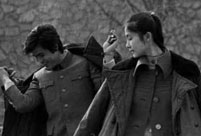Tuhao is just one of many words coined and redefined by Chinese Internet users to mock and deride the lavish lifestyles and consumption that have become so popular.
Sociologists say buzzwords like tuhao become popular overnight because they are a good way for ordinary people, who are under great financial pressure and without prospects, to express their anger about the widening wealth gap and their jealousy about riches far beyond their grasp.
Since the words do not drip with venom, they are more acceptable than railing against China’s nouveau riche.
Another buzz word of 2013, in contrast with tuhao, is gao da shang (高大上), which stands for gao duan (high end 高端), da qi (elegant 大气) and shang dangci (another word for high end 上档次). It is often used to flatter, with a touch of humor, a chic life style or product.
A less popular expression, which also combines the first words of three expressions, is di she nei (低奢内), which stand for di diao (low profile 低调), she hua (luxurious 奢华) and you nei han (cultivated, well-bred 有内涵).
The two phrases are often used in conjunction with tuhao, in lines such as, “Say bye bye to tuhao and welcome gao da shang,” “a real gao da shang lifestyle of a real tuhao,” or “Congratulations on stepping up from tuhao to gao da shang and di she nei.”
“I despise people who wear luxury brand logos all over them as if they feared people couldn’t recognize the expensive clothes and shoes they are wearing,” says Chen Bin, who is in mining, real estate and other business.
“I went through that period more than 10 years ago. I’ve paid my dues and cultivated my taste. Now it’s time to appreciate the really fine and valuable things in life, instead of chasing the brand,” he says.
The hierarchy among those who got wealthy a while ago and those who just started spending on expensive brands is getting clearer. China doesn’t have much old money left since 1949, and there is only difference between new rich and newer rich.
While the newer rich is still obsessed with conspicuous designer clothes, watches, shoes and cars, the new rich has moved on to tailor-made products, antiques, traditional and contemporary art, Chinese tea, private culture classes, and charitable works — symbols of gao da shang and di she nei.
“A lot of my clients are worried they may attend an event to find dozens of other rich people wearing exactly the same belt, watch or necklace,” says tuhao dresser and personal shopper Stephanie Zhou.
“They are totally willing to pay a lot more when it comes to tailor-made garments, and some of them sponsor my trips to Paris and Milan to buy the most updated fashion,” she says.
Zhou considers her earlier work experience in Milan her entre to the job from most of her tuhao clients.
 Heavy cargo flights taking off
Heavy cargo flights taking off In pictures: PLA's digital equipment
In pictures: PLA's digital equipment  Americans mark Thanksgiving Day with parades
Americans mark Thanksgiving Day with parades Love searching stories in cities
Love searching stories in cities  Shanghai shrouded in heavy fog
Shanghai shrouded in heavy fog Office ladies receive ‘devil’ training in mud
Office ladies receive ‘devil’ training in mud Changes in Chinese dancing culture
Changes in Chinese dancing culture  Highlight of Mr Bodybuilding and Miss Bikini Contest
Highlight of Mr Bodybuilding and Miss Bikini Contest  Picturesque scenery of Huanglong, NW China
Picturesque scenery of Huanglong, NW China China's moon rover, lander
China's moon rover, lander Spring City Kunming witnesses snowfall
Spring City Kunming witnesses snowfall Citizens rush to buy cars
Citizens rush to buy cars  Life in an ancient academy
Life in an ancient academy Best photos of the week
Best photos of the week White-collars, black eyes
White-collars, black eyesDay|Week|Month